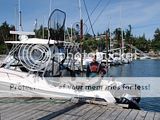SerengetiGuide
Well-Known Member
Another thing to note is it seems it all depends who you ask how the returns are going to be...last fall was reading (forget where, will attempt to find link as it was on the internet) that 2010 returns were expected to be much better than 2009...and some of best in years.
As for Alberni fishing, obviously it was pretty bad there after the commercial opening, and not great before even. But it is impossible to expect every run to have good returns every year in my opinion...still a shame...don't get me wrong...but I think you get what I'm attempting to say...I don't think any one year everyone will ever be happy with returns of salmon.
www.serengetifishingcharters.com
*NEW VIDEO*
http://www.youtube.com/watch?v=GlEzuNC59ck
As for Alberni fishing, obviously it was pretty bad there after the commercial opening, and not great before even. But it is impossible to expect every run to have good returns every year in my opinion...still a shame...don't get me wrong...but I think you get what I'm attempting to say...I don't think any one year everyone will ever be happy with returns of salmon.
www.serengetifishingcharters.com
*NEW VIDEO*
http://www.youtube.com/watch?v=GlEzuNC59ck


